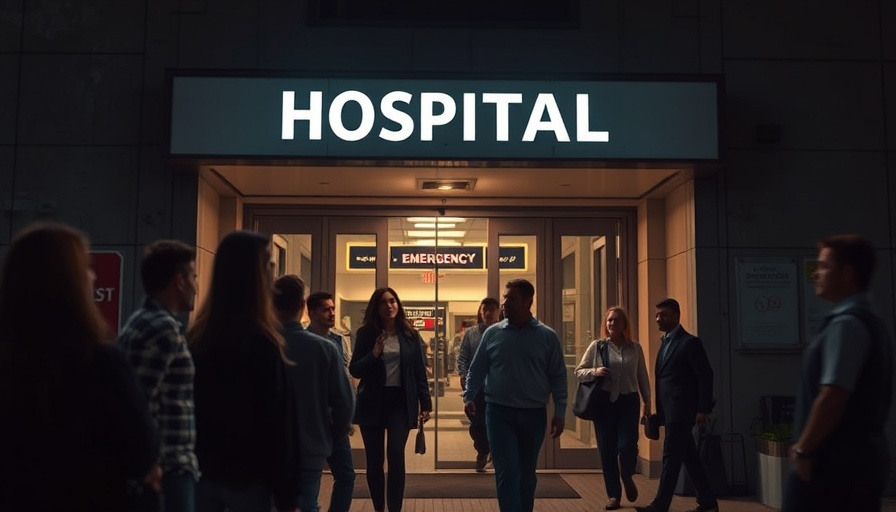
The Challenges Faced by Gaza's Healthcare System Amid Ongoing Conflict
As the situation in Gaza evolves, the resilience of its healthcare system is being tested like never before. The recent blackout that plunged the Al-Ahli Arab Hospital into darkness highlights the pressing challenges the hospital faces in providing essential care to its patients. With the ongoing conflict, electricity outages have become a harsh reality for many in the region, complicating efforts to deliver medical assistance. Healthcare workers continue their operations, often under dire circumstances, reflecting their dedication amid adversity.
In 'Gaza Hospital Continues To Operate While Blackout Leaves Doctors, Patients In Darkness', the discussion dives into the healthcare challenges faced by Gaza's hospitals amid escalating crises, prompting further analysis of the systemic issues at play.
The Vital Role of Al-Ahli Arab Hospital During Crises
The Al-Ahli Arab Hospital stands as a beacon of hope in a war-torn area, serving not only as a medical facility but as a pivotal institution during crises. The hospital has countless stories of professionals who work tirelessly to save lives regardless of the surrounding chaos. During one significant recent operation, surgeons performed complex procedures aided by minimal resources, showcasing the hospital's pivotal role in the community. This resilience brings to light the challenges healthcare providers face—not merely as practitioners but as members of a society enduring profound distress.
Impact of Blackouts on Patient Care
The repercussions of power outages extend beyond the immediate disruption of hospital functions. They impact everything from the delivery of surgeries to life-saving treatments and simple patient monitoring. The blackout in Gaza exemplifies how infrastructural deficiencies directly threaten health outcomes, leaving healthcare workers scrambling for solutions and planning for the unknown. The stressful environment forces them to utilize backup generator systems that can only offer limited support, placing an additional burden on already strained medical personnel.
Interventions from the International Community
The plight of hospitals like Al-Ahli is not unnoticed on the global stage. International organizations have mobilized efforts to provide technical support and humanitarian aid, recognizing the critical need in Gaza. Their involvement features a range of responses, from humanitarian assistance to advocacy for improved infrastructure. Despite the ongoing political strife, the coordination of aid signifies a collective global responsibility to ensure the right to health and safety for all, especially those in conflict zones.
The Emotional Toll on Healthcare Workers and Families
The emotional ramifications of working in a conflict zone weigh heavily on healthcare professionals. Many carry personal stories of loss and hardship, which inform their commitment to care. For families with loved ones in the hospital, uncertainty breeds anxiety and fear. Children missing educational opportunities due to the conflict’s impact further exacerbate the stressors in their lives. The interconnected nature of health and wellbeing amid such crises forms a larger narrative of resilience and desperation. This emotional landscape reveals a profound truth about human connection during times of strife.
Countries’ Responses and Future Predictions
As conditions in Gaza continue to change, predictions regarding its future are complex. Engagement from various international bodies indicates a recognition of the need for improved stability and support. The establishment of sustainable healthcare practices becomes critical as local and global efforts intertwine. Countries are beginning to acknowledge and respond to the importance of long-term resilience for Gaza’s health and infrastructure. With the U.S. government keeping an eye on Gaza and its complications, renewed efforts can influence a broader reassessment of healthcare in conflict zones.
Call to Action: Support Healthcare in Crisis
As we reflect on the challenges faced by healthcare systems in conflict areas like Gaza, it becomes imperative to support organizations and initiatives that provide essential healthcare. Contributing to humanitarian efforts can make a significant difference, ensuring that medical personnel receive the resources they need to continue their important work. The international community’s efforts not only highlight the struggles within Gaza but also represent a broader call for action among individuals and nations alike.
 Add Element
Add Element  Add Row
Add Row 



Write A Comment